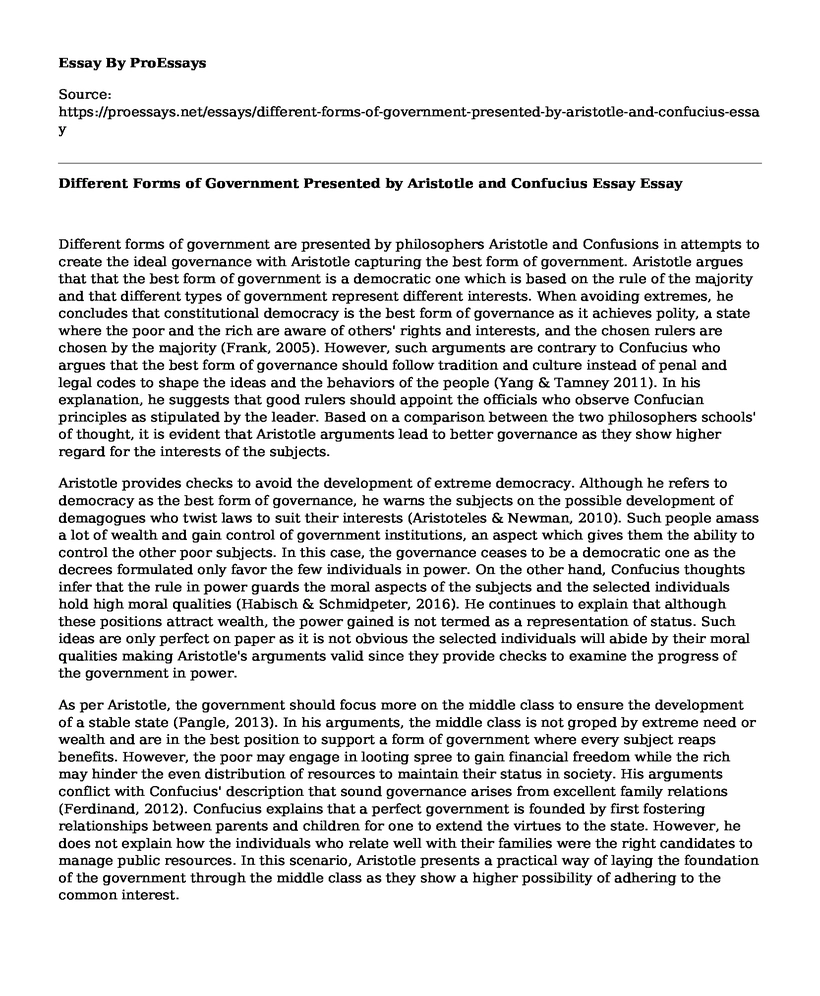Different forms of government are presented by philosophers Aristotle and Confusions in attempts to create the ideal governance with Aristotle capturing the best form of government. Aristotle argues that that the best form of government is a democratic one which is based on the rule of the majority and that different types of government represent different interests. When avoiding extremes, he concludes that constitutional democracy is the best form of governance as it achieves polity, a state where the poor and the rich are aware of others' rights and interests, and the chosen rulers are chosen by the majority (Frank, 2005). However, such arguments are contrary to Confucius who argues that the best form of governance should follow tradition and culture instead of penal and legal codes to shape the ideas and the behaviors of the people (Yang & Tamney 2011). In his explanation, he suggests that good rulers should appoint the officials who observe Confucian principles as stipulated by the leader. Based on a comparison between the two philosophers schools' of thought, it is evident that Aristotle arguments lead to better governance as they show higher regard for the interests of the subjects.
Aristotle provides checks to avoid the development of extreme democracy. Although he refers to democracy as the best form of governance, he warns the subjects on the possible development of demagogues who twist laws to suit their interests (Aristoteles & Newman, 2010). Such people amass a lot of wealth and gain control of government institutions, an aspect which gives them the ability to control the other poor subjects. In this case, the governance ceases to be a democratic one as the decrees formulated only favor the few individuals in power. On the other hand, Confucius thoughts infer that the rule in power guards the moral aspects of the subjects and the selected individuals hold high moral qualities (Habisch & Schmidpeter, 2016). He continues to explain that although these positions attract wealth, the power gained is not termed as a representation of status. Such ideas are only perfect on paper as it is not obvious the selected individuals will abide by their moral qualities making Aristotle's arguments valid since they provide checks to examine the progress of the government in power.
As per Aristotle, the government should focus more on the middle class to ensure the development of a stable state (Pangle, 2013). In his arguments, the middle class is not groped by extreme need or wealth and are in the best position to support a form of government where every subject reaps benefits. However, the poor may engage in looting spree to gain financial freedom while the rich may hinder the even distribution of resources to maintain their status in society. His arguments conflict with Confucius' description that sound governance arises from excellent family relations (Ferdinand, 2012). Confucius explains that a perfect government is founded by first fostering relationships between parents and children for one to extend the virtues to the state. However, he does not explain how the individuals who relate well with their families were the right candidates to manage public resources. In this scenario, Aristotle presents a practical way of laying the foundation of the government through the middle class as they show a higher possibility of adhering to the common interest.
Conclusion
Aristotle describes sound governance as one that questions the quality of the laws put in place and initiates changes if need be. Although the government expects the subjects to follow its rules, it should ensure the same results benefit the subjects (Evangeliou, 2009). When ensuring the soundness of the rules, Aristotle suggests the re-evaluation of rules when they do not portray a common interest. Such is not the case in the form of governance according to Confucius where the leaders are towards justifying their rule. In this form of governance, leaders fear to lose the mandate of heaven and popularity by perpetuating the present laws even though they do not bear any benefits to the subjects. Olberding (2013) state that rulers supported low taxes which rendered the government unable to provide better services resulting in extortion of money by the government officials from the subjects. In this case, Aristotle presents the ideal government which questions the validity of laws to ensure they profit the subjects.
References
Aristoteles & Newman, W. L. (2010). Essay on constitutions, books VI-VIII - text and notes. Cambridge: Cambridge Univ. Press.
Evangeliou, C. C. (2009). Hellenic philosophy: Origin and character. Farnham: Ashgate.
Ferdinand, P. (2012). Governance in Pacific Asia: Political economy and development from Japan to Burma. New York: Continuum International Pub. Group.
Frank, J. (2005). A democracy of distinction: Aristotle and the work of politics. Chicago (Ill.: University of Chicago Press.
Habisch, A., & Schmidpeter, R. (2016). Cultural Roots of Sustainable Management: Practical Wisdom and Corporate Social Responsibility.
Olberding, A. (2013). Dao companion to the Analects. Dordrecht: Springer.
Pangle, T. L. (2013). Aristotle's teaching in the Politics. Chicago; London: University of Chicago Press.
Yang, F., & Tamney, J. B. (2011). Confucianism and spiritual traditions in modern China and beyond. Leiden: Brill.
Cite this page
Different Forms of Government Presented by Aristotle and Confucius Essay. (2022, Dec 06). Retrieved from https://proessays.net/essays/different-forms-of-government-presented-by-aristotle-and-confucius-essay
If you are the original author of this essay and no longer wish to have it published on the ProEssays website, please click below to request its removal:
- History of US Law Enforcement Essay
- How Gender Roles Affect One's Social Experiences and Personal Identity
- Minority Influence and Social Change Essay Example
- Article Analysis Essay on Are You a Robot
- Essay Example on the Sacred Mecca: Uniting Muslims from Across the Globe
- Sergeant Majors: Establishing a Positive & Ethical Climate - Essay Sample
- Essay Example on Christian's Biblical Worldview: Purpose, Influence, Interaction







